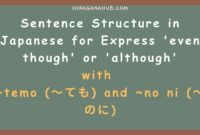Grammar ~te iru, ~te imasu (~ている、~ています)
Hello everyone! Today, we will learn one of the important and commonly
used grammar points in Japanese, ~te iru (~ている),
which indicates an ongoing action or state. This is similar to the
present continuous tense in English. In this article, we will discuss
the different forms of this grammar, including the casual form, the
polite form, and the negative form. We will also provide example
sentences that you can use in everyday conversations.

What Is ~te iru and ~te imasu?
The ~te iru form is used to express an action or
state that is currently happening. It is similar to the
present continuous tense in English. The polite form
of ~te iru is ~te imasu, which is
used in more formal settings or with people you respect.
The basic formula for constructing sentences with
~te iru or ~te imasu is by first
changing the verb into its ~te form, then adding
iru (いる) for the casual form or
imasu (います) for the polite form.
Casual Form ~te iru (~ている)
In the casual form ~te iru, we use
iru (いる), which is often shortened in everyday
conversation. This form is commonly used in casual conversations
between friends, family, or people you are familiar with. Here are
some example sentences using the casual form:
アレッシオさんはプログラミングをしている
(Aresio-san wa puroguramingu o shite iru)
Alessio is programming.
いま、えいがをみている
(Ima, eiga o mite iru)
Right now, I am watching a movie.
あなたはなにをしている?
(Anata wa nani o shite iru?)
What are you doing?
Polite Form ~te imasu (~ています)
For the polite form of ~te iru, we use
~te imasu. This form is more formal and is used in
situations where politeness is required, such as when speaking with
superiors, teachers, or older individuals. Here are some example
sentences with ~te imasu:
アレッシオさんはプログラミングをしています
(Aresio-san wa puroguramingu o shite imasu)
Alessio is programming.
いま、えいがをみています
(Ima, eiga o mite imasu)
Right now, I am watching a movie.
おてつだいしていますか?
(O tetsudai shite imasu ka?)
Are you helping?
Negative Form ~te inai (~ていない)
In addition to the casual and polite forms, we also have a negative
form of ~te iru. When we want to say that an action
is not happening, we add inai (いない) for the casual
form or imasen (いません) for the polite form.
Example sentences:
アレッシオさんはプログラミングをしていない
(Aresio-san wa puroguramingu o shite inai)
Alessio is not programming.
いま、えいがをみていない
(Ima, eiga o mite inai)
Right now, I am not watching a movie.
あなたはなにもしていない
(Anata wa nanimo shite inai)
You are not doing anything.
General Pattern in Using ~te iru
The ~te iru or ~te imasu form is
often used to express an action that is currently ongoing, but it is
also used to describe a state or a habitual action. For example,
わたしはとうきょうにすんでいる (Watashi wa Toukyou ni
sunde iru) means “I live in Tokyo,” indicating a long-term state or
condition.
Using Casual and Polite Forms in Everyday Life
Understanding when to use the casual form or the polite form is
important in Japanese, especially in different social contexts. If
you’re speaking with close friends or people of the same age, the
casual form ~te iru is sufficient. However, if you’re
speaking to someone older or more respected, it’s advisable to use the
polite form ~te imasu to show respect.
Difference Between Casual and Polite Sentences
Here are examples showing the difference between the casual and polite
forms:
-
Casual:
ぼくはさっかーをしている (Boku wa sakkaa o shite
iru) – I am playing soccer. -
Polite:
わたしはさっかーをしています (Watashi wa sakkaa o
shite imasu) – I am playing soccer.
Both sentences have the same meaning, but the polite form is more
appropriate in formal settings.
Expressing Ongoing Actions with ~te iru
Besides being used for ongoing actions, ~te iru is
also used to describe a habit or something that has become a permanent
state. For example:
-
わたしはまいにちじょぎんぐをしている
(Watashi wa mainichi jogingu o shite iru)
I jog every day. -
かれはえいごをはなしている
(Kare wa eigo o hanashite iru)
He is speaking in English.
Expressing Actions That Haven’t Happened Yet
To express that an action hasn’t happened yet, we can use the negative
form ~te inai or ~te imasen. In
everyday conversation, ~te inai is commonly used to
indicate that something hasn’t happened yet.
Examples:
-
わたしはまだたべていない
(Watashi wa mada tabete inai)
I haven’t eaten yet. -
かのじょはまだきていない
(Kanojo wa mada kite inai)
She hasn’t come yet.
Rephrased: Negative Form Examples
Below are some examples that show actions or states that are not
happening:
わたしはまだプログラミングをしていない
(Watashi wa mada puroguramingu o shite inai)
I haven’t started programming yet.
いま、えいがをみていません
(Ima, eiga o mite imasen)
Right now, I am not watching a movie.
あなたはなにもしていません
(Anata wa nanimo shite imasen)
You are not doing anything.
Conclusion
In this article, we’ve learned about the ~te iru and
~te imasu grammar points in Japanese. The
~te iru form is used to express actions that are
ongoing, while ~te imasu is the polite version. We’ve
also seen the negative form ~te inai or
~te imasen, which is used to say that an action is
not happening. Understanding the difference between casual and polite
forms is essential for effective communication in Japanese.
By learning and mastering this grammar, you’ll find it easier to speak
Japanese and express actions that are currently happening or states
that are ongoing.
If you want to learn more about the Japanese language, don’t hesitate
to look for free online Japanese language lessons!
Many platforms offer free online resources that can
help you learn Japanese in a fun and effective way.
Vocabulary List
| Kanji | Hiragana | Romaji | Meaning |
|---|---|---|---|
| 日本語 | にほんご | nihongo | Japanese language |
| 映画 | えいが | eiga | Movie |
| 勉強 | べんきょう | benkyou | To study |
| 見る | みる | miru | To watch |
| する | する | suru | To do |
| 知る | しる | shiru | To know |
| 愛する | あいする | aisuru | To love |
| 決まる | きまる | kimaru | To be decided |
| 食べる | たべる | taberu | To eat |
| 来る | くる | kuru | To come |
| 英語 | えいご | eigo | English language |
| ジョギング | じょぎんぐ | jogingu | Jogging |
With a solid understanding of ~te iru and
~te imasu, you will be more confident in speaking
Japanese. Happy learning!


